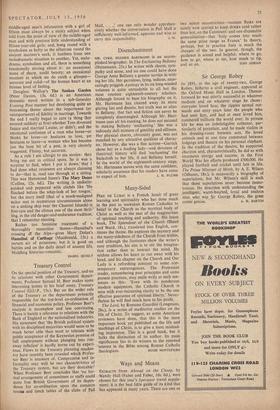Sir George Robey
IN 1891, at the age of twenty-two, George Robey, hitherto a civil engineer, appeared at the Oxford Music Hall in London. Thence- forward he was utterly successful in whatever medium and on whatever stage he chose: everyone loved him; the ripples spread out- wards and sixty years later the people who had seen him, and had at once loved him, numbered millions the world over. In private life he was an indefatigable collector, par- ticularly of porcelain, and he made violins in his dressing-room between acts. He loved animals and at one time commuted between lodgings and theatre on his personal elephant. In the tradition of the theatre, he supported charities and, characteristically, he did so with enormous energy and success; in the First World War his efforts produced £.500,000. He played football and cricket until late in life. The Prime Minister of Mirth, by A. E. Wilson (Odhams, 18s.), is necessarily a biography of superlatives, but Mr. Wilson's skill is such that these superlatives never become mono- tonous. He describes with understanding the intelligent, warm-hearted, loyal and zealous man who was Sir George Robey, the great


































 Previous page
Previous page